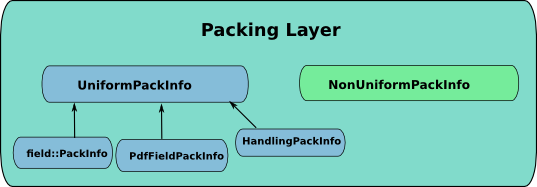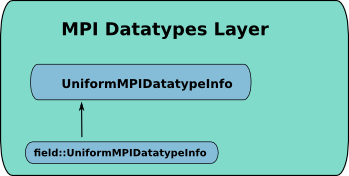|
waLBerla 7.2
|
|
waLBerla 7.2
|
Describes concept from mpi buffer to communication schemes.
The communication related code in waLBerla is not at a specific position but distributed among multiple modules. This page gives an overview on how MPI communication is handled in waLBerla. Here mainly the code architecture is described, to get a feeling on how to setup a parallel simulation look at Ghost Layer Communication .
There a two communication strategies implemented in waLBerla: "buffered" and "direct" communication. When using buffered communication the number of messages per communication step is minimized, i.e. only one message per neighboring process is sent/received. Data belonging to different block data items and different blocks are packed inside a buffer and sent as one big message. The direction communication strategy uses no intermediate buffers and sends one message per block and block data. This is handled using MPI data types which means that the packing is delegated to the MPI library. One possible advantage of this strategy is that packing and sending can be overlapped. Direct communication is currently also the only way to communicate from/to GPUs.

The first layer above the MPI library is the Buffer Layer (located in core/mpi) . Important classes are walberla::mpi::SendBuffer and walberla::mpi::RecvBuffer. These buffers overload the operator>> and operator<< to store native data types in raw format. The receive buffer has to read the values in the same order as they were written into the SendBuffer. For a simple example have a look at the unit test BufferTest.cpp . To pack and unpack new classes, one has to implement the corresponding operator for the class. This has been done for many types in the STL and of course for most waLBerla types ( see BufferDataTypesExtension.h )

These two Buffers are used by the walberla::mpi::BufferSystem and walberla::mpi::OpenMPBufferSystem classes which associate the Buffers with ranks/processes. For each communication partner, the BufferSystem holds a walberla::comm::SendBuffer and a walberla::mpi::RecvBuffer, which store the data that has to be sent to this process, or was received by it.
Besides the buffer related classes, helper functions for collective MPI operations exist in Gatherv.h , Reduce.h and Broadcast.h

The next important part of the communication are PackInfos. There exist two interfaces, one for uniform grids and one for refined grids. A PackInfo specifies how to extract data from a block and how to inject this data into another block. For details have a look at walberla::communication::UniformPackInfo and, as an example implementation, walberla::field::communication::PackInfo.

The control layer can now use all the functionality provided by the layers below, to implement the communication logic. It consists of communication schemes, the most prominent is walberla::blockforest::communication::UniformBufferedScheme . It exchanges information with all neighboring blocks, where the data extraction and insertion is handled by the registered PackInfos. There are other more specialized schemes available, as an example have a look at walberla::blockforest::communication::DirectionBasedReduceScheme.

To communicate data using direct communication one has to specify a MPI datatype for the block data. This can be done by implementing the interface walberla::communication::UniformMPIDatatypeInfo . For waLBerla fields this is already implemented in walberla::field::communication::UniformMPIDatatypeInfo using functions provided in field/communication/MPIDatatypes.h .

The scheme class for the direct communication strategy is blockforest::communication::UniformDirectScheme . Here one can registered multiple UniformMPIDatatypeInfo's instead of PackInfo's .